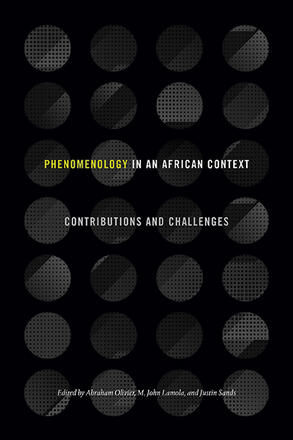
Phenomenology in an African Context
Contributions and Challenges
Alternative formats available from:
The first edited collection to offer a systematic introduction to African phenomenology.
Description
African phenomenology is an emerging subfield within the broader domain of African and Africana philosophy. The phenomenological method, with its various approaches to studying the seminal structures and meaning of human experience, has been a cornerstone in the thought of African philosophers such as Paulin Hountondji, Tsenay Serequeberhan, Achille Mbembe, D. A. Masolo, and Mabogo More, as well as proponents of Africana philosophy such as W. E. B. Du Bois, Frantz Fanon, Lucius Outlaw, and Lewis Gordon. Technically, however, the term "African phenomenology" is not used as widely, or introduced as systematically, as Africana phenomenology. This anthology aims to fill this gap by exploring contributions and challenges to phenomenology in its African context and demonstrating the differences this context makes to the practice of phenomenology. Written by some of the most eminent scholars in the field—including Hountondji, Serequeberhan, Mbembe, More, Gordon, and M. John Lamola—the sixteen original essays here address the relation of African phenomenology to African/Africana philosophy, postcolonial/decolonial discourse, and deliberations within the international phenomenological community.
Abraham Olivier is Professor of Philosophy at the University of Fort Hare. He is the author of Being in Pain. M. John Lamola is Associate Professor of Philosophy of Technology at University of Johannesburg. He is the author of Sowing in Tears: A Documentary History of the Church Struggle Against Apartheid, 1960–1990. Justin Sands is Research Fellow at the University of the Free State, Extraordinary Fellow at North-West University, and Senior Lecturer at St. Augustine College of South Africa. He is the author of Reasoning from Faith: Fundamental Theology in Merold Westphal's Philosophy of Religion.
Reviews
"In Africa, as in other formerly colonized areas of the world, the field of indigenous philosophy has been obscured by an imperial relation with Western philosophy. Subfields such as ontology, metaphysics, and epistemology have been eclipsed by political and socioeconomic philosophy. Among the major strengths of this book is the effective way in which it brings African phenomenology out from under this double cloud of invisibility." — Paget Henry, author of Shouldering Antigua and Barbuda: The Life of V. C. Bird
"This volume usefully sees phenomenology not just as a foreign philosophical method but also as a way of understanding that African philosophy has been engaging in and which it has something to contribute to." — Bruce B. Janz, author of African Philosophy and Enactivist Cognition: The Space of Thought